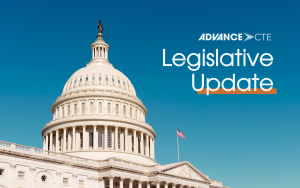
This week, Advance CTE and partners formally requested an extension of the comment period for a recent U.S. Department of Education (ED) proposal impacting state and local Career Technical Education (CTE) systems. In addition, Congress passed a highly-anticipated extension of federal funding ahead of an important deadline while the House and Senate examined issues related to Artificial Intelligence and teacher preparation.
Advance CTE Requests ICR Comment Extension
As Advance CTE has shared previously, the U.S. Department of Education (ED) has recently proposed significant changes impacting planning and reporting requirements stemming from the Carl D. Perkins Career and Technical Education Act (Perkins V). As states and the CTE community have continued to review these proposals, a supporting document related to the Consolidated Annual Report (CAR) was recently updated by ED, reflecting substantial new changes proposed as part of this new Information Collection Request (ICR). Given ED is seeking thoughtful and meaningful feedback from the CTE community, Advance CTE and the Association for Career and Technical Education (ACTE) have formally requested a 30-day extension of the underlying comment period. We encourage other stakeholders to emphasize to ED directly the importance of providing adequate time through this comment period for the CTE field to review these substantial changes to Perkins V implementation.
Congress Passes Continuing Resolution and Adjourns Until Mid-November
Late Wednesday evening, Congress passed a three-month extension of fiscal year 2024 federal funding—just a few days before the formal start of the 2025 federal fiscal year (FY25) was set to begin on October 1. The extension, known as a continuing resolution (CR), provides lawmakers additional time to focus on campaigning for the fast-approaching November elections. The expiration of the CR on December 20, near the end of Congress’ upcoming “lame duck” session, also provides more time for lawmakers to negotiate a compromise on a full-year FY25 funding bill during this last stretch of the 118th Congress.
In the meantime, education and workforce development programs like Perkins V’s state grant program will be supported at the same FY24 funding levels for this period. Shortly after the passage of the CR, which cleared both chambers on a wide bipartisan basis, Congress formally recessed, with lawmakers expected to return on November 15. Advance CTE will continue to advocate for a strengthened investment in CTE made via Perkins V as this process moves forward later this year.
Senate HELP Subcommittee Discusses AI and Workforce
This week, the Senate Health, Education, Labor, and Pensions (HELP) Committee’s Subcommittee on Employment and Workplace Safety, led by Sens. Hickenlooper (D-CO) and Braun (R-IN), convened a hearing to discuss the implications of Artificial Intelligence (AI) for workers and efforts to prepare them for the future. The panel questioned an array of witnesses about AI’s growth and the workforce’s changing nature. Panel members, AI industry leaders, an economist from LinkedIn, and a human resources director spoke about the importance of thoughtful guard rails and regulatory frameworks needed for industry leaders to support responsible AI development.
Witnesses highlighted the need for a changing workforce to be highly-skilled in an emerging field and how community and technical colleges, in particular, can help equip learners with the skills needed for future success in the emerging era of AI. Sen. Kaine (D-VA) specifically highlighted the importance of expanding federal Pell Grant eligibility for shorter-term CTE programs as a key strategy to help support workers and learners in the future as AI technologies continue to evolve and impact many facets of daily life.
More on the hearing, including witness testimony and an archived webcast
House Examines Teacher Preparation Efforts
On Wednesday, the House Education and the Workforce Committee’s Subcommittee on Early Childhood, Elementary, and Secondary Education held a hearing titled “Innovative Teacher Preparation: Properly Equipping America’s Educators.” The subcommittee hearing, led by Chair Bean (R-FL) and Ranking Member Bonamici (D-OR), focused on persistent teacher shortages facing schools and communities across the nation and examined ways to prepare teachers for entry into the workforce more effectively. In particular, Rep. Bonamici highlighted the important role that CTE programs can play in these efforts, while witnesses discussed how teacher preparation efforts should also be sure to incorporate CTE educators. Opening statements, witness testimony, and more related to the hearing can be found here.
Advance CTE has continued to focus on these efforts, and more to prepare the CTE educator workforce needed for today and tomorrow:

